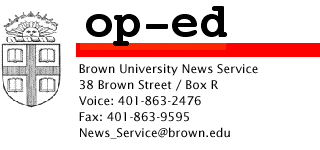Distributed January 31, 2003
Copyright ©2003 by Brent Stuart Goodwin
Op-Ed Editor: Mark Nickel
About 465 Words
Brent Stuart Goodwin
Clipping the Barbershop controversy
Critics charge that the film Barbershop is disrespectful to civil rights leaders Rosa Parks and Dr. Martin Luther King Jr. Defenders say the film carries an important message about freedom of speech. In either case, news that one of the film’s stars will emcee the NAACP’s Image Awards show suggests that the controversy might be at an end.
The NAACP’s selection of Cedric The Entertainer, one of the stars of the hit movie Barbershop, as emcee of the 34th NAACP Image Awards show on March 8 should effectively end a controversy that NAACP chair Kweisi Mfume has described as “overblown.” Dialogue in the film had struck some as disrespectful to civil rights icons Rosa Parks and Dr. Martin Luther King Jr. Cedric’s character Eddie frequently initiated the wide-ranging debates that took place among the barbershop’s patrons and staff.
Central to the controversy is whether there must be an orthodoxy within the black community – or any other community, for that matter. Throughout the film, Eddie makes many statements, some of which are off the wall, some of which contain a grain of truth. Just as the services the barbershop provides are many and varied, so too are the opinions offered.
Freedom of speech does not carry a right to be unoffended. Indeed, speech that is viewed as non-conforming by those who seek an orthodoxy of thought or truncation of debate is most in need of protection. Membership in a community is not necessarily based upon agreement but rather on the consent of the members. While many of the other characters in the film find Eddie a bit over-the-top and perhaps even out of touch, they accept him without question because he cares about the barbershop and all who enter. Eddie is accepted in spite of his opinions, not because of them.
Another character illustrates the sense of community that pervades the film: Isaac, a new barber who happens to be white, played by Troy Garity. Isaac just wants to be the best barber he can be. He is accepted as part of the group when he demonstrates that he is just as good a barber as anyone else. Being part of the group is not simply a function of uniformity of thought, which is impossible and undesirable, or of skin pigmentation, which is an immutable characteristic, but of character and ability, which are the only truly reliable human qualities for judgment.
It is difficult to understand why there was any controversy at all. Critics of the film’s iconoclasm seem to miss the film’s point. No one seriously doubts the contributions of Rosa Parks and Dr. King to the civil rights movement. In any case, Eddie’s character is not about his opinions but his right to express those opinions and his right to membership in a community irrespective of his opinions. Eddie and Isaac are accepted by the group on the basis of their ability and the content of their character.
Critics of the film have the right to make their point, but that just strengthens the thesis presented here. Discussion and debate strengthen a community, while rigidity of thought serves only to weaken it.





